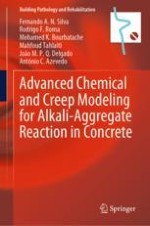This book presents the numerical results of the use of the chemical model to analyse the advancement of the reaction and the mechanical model to simulate creep and shrinkage phenomena in COMSOL Multiphysics®, as a way to reassess concrete structures suffering from those mechanisms. Both models were implemented separately to evaluate their responses and compare them with the theoretical results and experimental benchmarks presented in the literature. The numerical simulation results showed excellent agreement with the experimental results data, with maximum disagreement not exceeding 10%, indicating that the implementation of the developed numerical models behaved very efficiently.
